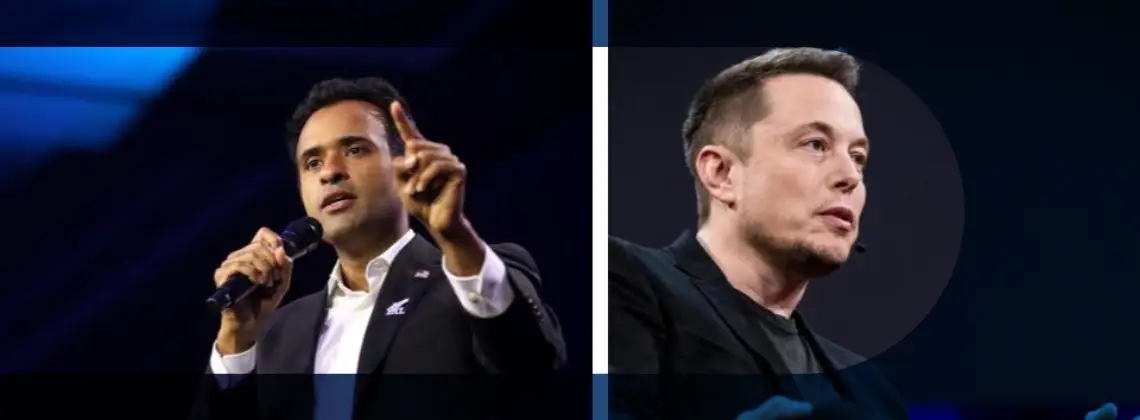News analysis
Musk and Ramaswamy appointments signal a big governance shift

The Musk and Ramaswamy appointments are not shocking – Trump had been teasing a move like this for months – but they do mean a lot for the future of governance in the United States and further afield, too.
Elon Musk and Vivek Ramaswamy are two more recent high-profile additions to the American conservative engine. Since their arrival, their message has always been pro-business and anti-regulation, firmly against the issues that have dominated world economies in recent years, such as ESG, DEI, and increased reporting.
Now that both have key positions in the new Trump administration, they can turn those personal beliefs into government policy under the guide of their like-minded boss, who had vowed to be a “threat to bureaucracy” from day one of his second term in the White House.
Quick recap: What and who?
Elon Musk and Vivek Ramaswamy have been appointed to lead a new “Department of Government Efficiency (DOGE)” until July 2026, working closely with Donald Trump and his budget teams.
Musk is the long-time owner of Tesla, who purchased the social media site X (then known as Twitter) in October 2022. Musk vowed to promote free speech and abolish fact-checking policies. X is estimated to have lost 70-80% of its value since Musk acquired it.
Ramaswamy was an early contender in the 2024 Republica primaries. He endorsed Trump soon after dropping out. He is the founder of pharmaceutical firm Roviant Sciences and also has a career history in investment.
Both are staunchly against any idea of bureaucracy, government oversight, excessive public spending, and regulations.
What does this news mean?
It signals a new direction for US economic policy and a dramatic reversal of decades worth of trends under successive Presidents. It’s even a stark departure from Trump’s first term, which focused on priorities like immigration and the border wall.
Make no mistake: This is huge news from a corporate governance perspective.
One of modern governance’s most influential stakeholder groups is regulators, who hold increased powers and enforce more uniform, universal standards. Musk, Ramaswamy and DOGE will be at odds with all of that.
According to the Financial Times, DOGE’s goal is to “dismantle” bureaucracy and “slash” regulations. This means that their actions will likely dissolve key parts of the newfound strength regulators have amassed over the years.
This applies to multiple sectors, including financial reporting, antitrust compliance, climate data, and social issues like DEI. Many of these issues were core priorities of the Biden administration and built on years of laws under other presidents.
Any boards across the United States that have devoted a lot of time and energy to complying with these new regulations will likely have to rethink their strategic approach in the future.
It’s not clear yet how this rethink will look. We need a clearer picture of where DOGE will cut rules and spending. Then, we need to know if their decisions will hold up against the inevitable court challenges. We also need to gauge investor moods toward the changes. There’s still a lot to unpack.
So, is this good or bad news for corporate governance?
The vague but correct answer is that it depends on who you talk to. Ultimately, many in corporate governance might see the upcoming changes as a positive release of pressure.
One of the most common criticisms from boards and executives is that while they agree with increased oversight in principle, they hate it in practice because they simply can’t adapt their systems fast enough to meet compliance demands.
Voice those concerns to a future Trump administration, and you’ll likely be welcomed warmly with assurances that it’s about to get easier and more “like the old days:”. There will be less rules, fewer barriers, reduced reporting and more chances to focus on traditional governance goals like profit and shareholder success.
How likely is a big pressure release inside one presidential term? It’s difficult to say. Currently, Musk and Ramaswamy only have a job till July 2026, and then it’s anybody’s guess.
We need to look beyond Trump’s second term and wonder who might follow him. Will it be a like-minded Republican or a Democrat whose first move will be to put all the rules back in place?
This uncertainty creates a longer-term problem for businesses and something for directors to think about: How do you craft a compliance strategy in polarised politics, where alternating leaderships bring lax and strict oversight back and forth?
Think globally
We should also watch what DOGE does to American business regulation in an international context because while the US might be eliminating regulations, other jurisdictions won’t, and companies operating across borders will have to navigate this, too.
Consider two economies that are close allies of the US: The UK and the EU. Both have also had elections this year, but neither result came close to the pro-business surge seen in America. In the UK, centre-left Labour is now in power; in the EU, the status quo has been maintained with a Commission led by the centre-right, heavy on the regulations, just as before.
Both jurisdictions won’t have another election until 2029.
So, if you’re on the board of a company operating on both sides of the Atlantic, you’ll need to think about allocating resources as part of your strategy. It could be a remarkable difference in just a year or two: one side might demand heaps of ESG data and reporting, and the other might pretend the concept doesn’t exist.
Food for thought.
Insights on leadership
Want more insights like this? Sign up for our newsletter and receive weekly insights into the vibrant worlds of corporate governance and business leadership. Stay relevant. Keep informed.

